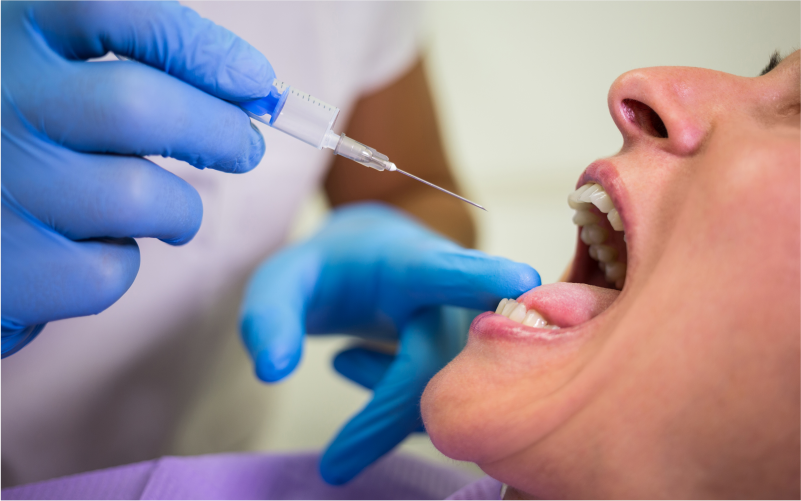Oral Cancer
Oral cancer (mouth cancer) is the most common form of head and neck cancer. It typically affects people aged 60 and older. Oral cancer affects your lips and the first parts of your tongue, mouth, roof, and floor. It also affects your oropharynx — the last part of your tongue and roof of your mouth, your tonsils, and the sides and back of your throat.Oral cancer can look like a common problem with your lips or in your mouth, like white patches or sores that bleed. The difference between a common problem and potential cancer is these changes don’t go away. Left untreated, oral cancer can spread throughout your mouth and throat to other areas of your head and neck. Approximately 63% of people with oral cavity cancer are alive five years after diagnosis.

Oral cancer is cancer that develops in the mouth or throat tissues. It can occur on the:
- Lips
- Tongue
- Gums
- The roof of the mouth
- The inner lining of the cheeks
- The floor of the mouth (under the tongue)
Symptoms
Some symptoms, such as toothache or cold, can be mistaken for early oral cancer symptoms. If symptoms continue for several weeks or months, it is essential to see the doctor to treat them as soon as possible if oral cancer is diagnosed. Many oral cancer-caused symptoms may be due to other less severe conditions or cancers.
Some of the most common oral cancer signs and symptoms include:
- Persistent mouth sores that do not heal
- Lump or thickening in the cheek
- Persistent mouth pain
- Numbness of the tongue or other areas of the mouth
- White or red patch on the gums, tongue, tonsil, or lining of the mouth
- Sore throat or a persistent feeling that something is caught in the throat
- Weight loss
- Loosening of the teeth
- Difficulty swallowing or chewing
- Jaw swelling that makes dentures hurt or fit poorly
- Difficulty moving the jaw or tongue
- Pain in the teeth or jaw
- Persistent bad breath
- Voice changes
- Lump in the neck
How do healthcare providers diagnose oral cancer?
Your dentist may spot potential oral cancer during one of your regular checkups. They may follow up with preliminary tests or refer you to an oral and maxillofacial surgeon or head and neck surgeon. These specialists are ear, nose, and throat (ENT) specialists.
Oral cancer tests include:
Physical examination: Your healthcare provider will look at the entire inside of your mouth and might feel around your mouth. They’ll also examine your head, face, and neck for potential signs of pre-cancer or cancer.
Brush biopsy, also called scrape biopsy or exfoliative cytology: Healthcare providers use a small brush or spatula to gently scrape the area in question to obtain cells examined for cancer.
Incisional biopsy: Your healthcare provider will remove small pieces of tissue to get cells to be examined for cancer.
Indirect laryngoscopy and pharyngoscopy: Your healthcare provider uses a small mirror on a long thin handle to look at your throat, the base of your tongue, and part of your larynx (voice box).
Direct (flexible) pharyngoscopy and laryngoscopy: They may use an endoscope to look at areas of your throat and mouth that can’t be seen with mirrors. An endoscope is a thin, flexible tube with an attached light and viewing lens.
Are there oral cancer stages?
Diagnostic tests help determine the cancer’s stage. A stage describes the cancer’s location if it has grown or penetrated the surface of the area where it was found. Tests also check to see if the cancer has moved to other areas in your body.
Healthcare providers use staging information to recommend treatment and help predict the chances of recovery.
Oral cancers are staged using the TNM system. T stands for the size and location of the primary tumor. N indicates if the tumor has spread to your lymph nodes. M indicates if the tumor has metastasized or spread to other areas of your body.
The stages of oral cavity cancer are:
TI: The tumor in your mouth measures 2 centimeters or less.
T2: The tumor is 2 centimeters or smaller but not larger than 4 centimeters.
T3: The tumor is more significant than 4 centimeters.
How do healthcare providers treat oral (mouth) cancer?
The three primary treatment options for oral (mouth) are surgery, radiation therapy, and chemotherapy. Talk to your doctor about the purpose, side effects, and ways to manage side effects for all of your options.
Your healthcare provider considers several factors before recommending treatment. Those factors include:
The kind of oral cancer that you have.
- If your oral cancer has spread from the primary site to other parts of your mouth and neck or other parts of your body.
- Your general health.
- Your age.
What surgeries treat oral cancer?
The most common surgeries for oral cancer are:
Primary tumor surgery: Healthcare providers remove tumors through your mouth or an incision in your neck.
Glossectomy: This is the partial or total removal of your tongue.
Mandibulectomy: This is surgery for oral cancer in your jawbone.
Maxillectomy: This surgery removes part or all of the hard palate, the bony roof of your mouth.
Sentinel lymph node biopsy: This test helps healthcare providers know if cancer has spread beyond the original oral cancer.
Neck dissection: This surgery removes lymph nodes from your neck.
Reconstruction: Surgery that removes large areas of tissue might be followed by reconstructive surgery to fill gaps left by the tumor or replace part of your lips, tongue, palate, or jaw. In some cases, reconstructive surgery takes healthy bones and tissue from other areas of your body.
What are other ways to treat oral cancer?
Healthcare providers may combine surgery with other treatments, including:
Radiation therapy: Radiation therapy uses intense beams of energy to kill cancer cells or keep them from growing. Your healthcare provider may combine radiation therapy with other treatments.
Targeted therapy: This cancer treatment uses drugs or other substances to precisely identify and attack specific types of cancer cells without hurting normal cells. Monoclonal antibodies are immune system proteins created in the lab and used to treat cancer.
Chemotherapy: Your healthcare provider may use anti-cancer drugs that kill cancer cells, including treatments that affect most body parts.
Immunotherapy: Immunotherapy is a cancer treatment that engages your immune system to fight the disease. The treatment is sometimes called biological therapy.
What can I do to prevent developing oral cancer?
Oral cancer can be prevented, and you can play an active role in preventing it. You can help prevent oral cancer with the following tips:
- If you smoke, chew tobacco, or use a water pipe, try stopping or cutting back. Talk to your doctor about smoking cessation programs.
- If you’re someone who drinks alcohol, drink in moderation.
- Remember your sunscreen. Use UV-AB-blocking sunscreen on your face and sunblock.
- Get vaccinated for human papillomavirus.
- Eat a well-balanced diet.
- Have regular dental checkups. People between the ages of 20 and 40 should have oral cancer screening every three years and annual exams after age 40.







